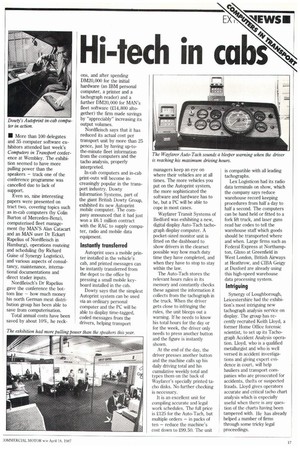Hi-tech in cabs\
Page 19

If you've noticed an error in this article please click here to report it so we can fix it.
• More than 100 delegates and 35 computer software exhibitors attended last week's Computers in Transport conference at Wembley. The exhibition seemed to have more pulling power than the speakers — track one of the conference programme was cancelled due to lack of support.
Even so, nine interesting papers were presented on tract two, covering topics such as in-cab computers (by Colin Burton of Mercedes-Benz), computerised fleet management (by MAN'S Alan Catacart and an MAN user Dr Eckart Rapelius of Nordfleisch in Hamburg), operations routeing and scheduling (by Richard Guise of Synergy Logistics), and various aspects of consultancy, maintenance, international documentations and direct trader inputs.
Nordfleisch's Dr Rapelius gave the conference the bottom line — how much money his north German meat distribution group has been able to save from computerisation.
Total annual costs have been saved by about 10%, he reck
ons, and after spending DM20,000 for the initial hardware (an IBM personal computer, a printer and a tachograph reader) and a further DM20,000 for MAN's fleet software (214,800 altogether) the firm made savings by "appreciably" increasing its output volumes.
Nordfleisch says that it has reduced its actual cost per transport unit by more than 25 pence, just by having up-tothe-minute fleet information from the computers and the tacho analysis, properly interpreted.
1n-cab computers and in-cab print-outs will become increasingly popular in the transport industry. Dowty Information Systems, part of the giant British Dowty Group, exhibited its new Autoprint mobile computer. The company announced that it had just won a 26.1 million contract with the RAC to supply computer, radio and mobile data equipment.
Instantly transferred
Autoprint uses a mobile printer installed in the vehicle's cab, and printed messages can be instantly transferred from the depot to the office by pressing a small mobile keyboard installed in the cab.
Dowty says that the simplest Autoprint system can be used via an ordinary personal computer and the PC will be able to display time-tagged, coded messages from the drivers, helping transport managers keep an eye on where their vehicles are at all times. The more vehicles you put on the Autoprint system, the more sophisticated the software and hardware has to be, but a PC will be able to cope in most cases.
Wayfarer Transit Systems of Bedford was exhibiting a new, digital display Auto-Tach tachograph display computer. A pocket-sized monitor unit is fitted on the dashboard to show drivers in the clearset possible way how much duty time they have completed, and when they have to stop to stay within the law.
The Auto-Tach stores the relevant hours rules in its memory and constantly checks these against the information it collects from the tachograph in the truck. When the driver gets close to infringing the rules, the unit bleeps out a warning. If he needs to know his total hours for the day or for the week, the driver only needs to press another button and the figure is instantly shown.
At the end of the day, the driver presses another button and the machine calls up his daily driving total and his cumulative weekly total and types them on the back of Wayfarer's specially printed tacho disks. No further checking is necessary.
It is an excellent unit for compiling accurate and legal work schedules. The full price is £125 for the Auto-Tach, but multiple orders — in packs of ten — reduce the machine's cost down to £99.50. The unit is compatible with all leading tachographs.
Lex Logisticon had its radio data terminals on show, which the company says reduce warehouse record keeping procedures from half a day to half a second. The computers can be hand held or fitted to a fork lift truck, and laser guns read bar codes to tell the warehouse staff which goods should be transported where and when. Large firms such as Federal Express at Northampton, Glaxo at Greenfield in West London, British Airways at Heathrow, and CIBA Geigy at Duxford are already using this high-speed warehouse data processing system.
Intriguing
Synergy of Loughborough, Leicestershire had the exhibition's most intriguing new tachograph analysis service on display. The group has recently recruited Keith Lloyd, a former Home Office forensic scientist, to set up its Tachograph Accident Analysis operation. Lloyd, who is a qualified metallurgist and who is well versed in accident investigations and giving expert evidence in court, will help hauliers and transport companies who are prosecuted for accidents, thefts or suspected frauds. Lloyd gives operators accurate and critical tacho chart analysis which is especially useful when there is any question of the charts having been tampered with. He has already helped a number of firms through some tricky legal proceedings.




















































































